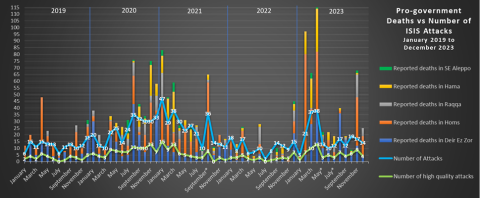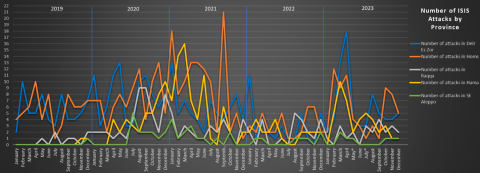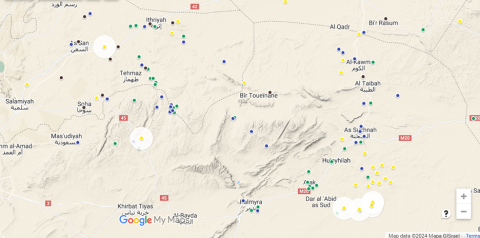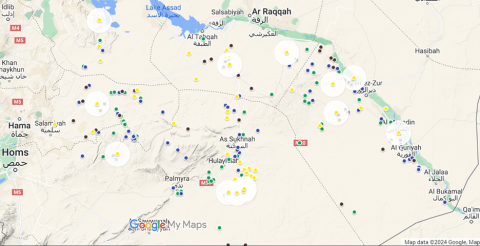Fact:
On May 8, 2019, Taliban insurgents detonated an explosive-laden vehicle and then broke into American NGO Counterpart International’s offices in Kabul. At least seven people were killed and 24 were injured.
Following is the December 2023 installment of “ISIS Redux: The Central Syria Insurgency,” a monthly chronicle of attacks by the terrorist group ISIS in central Syria. A review of developments throughout 2022 and 2021 can be found here and here. The January 2023 edition of ISIS Redux can be found here, February’s here, March’s here, April’s here, May’s here, June’s here, July’s here, August’s here, September’s here, October’s here, and November’s here. A full background and analysis of ISIS’s resurgence in Syria, including the methodology used to collect this data, can also be explored here, here, and here.
ISIS carried out at least 14 confirmed attacks in December in the Homs, Hama, Raqqa, Aleppo, and Deir Ez Zor governorates. These attacks killed at least 19 pro-Assad regime soldiers and six civilians and wounded at least 14 more soldiers and civilians. There were also four high quality* attacks during the month. The decrease in confirmed ISIS activity in December compared to November is largely due to the end of active fighting inside the Doubayat Oil Field in Homs. ISIS’s capture of this field in October, and the regime’s offensive to retake it in November, drove much of the Badia activity during those months. With the regime’s full recapture of the field by early December, activity in the area dropped significantly. Nevertheless, ISIS cells continued to conduct intermittent ambushes around the field while increasing attacks in Deir Ez Zor and maintaining a low level of activity in eastern Hama and Raqqa.
ISIS claimed one attack in central Syria this month, following the two claims last month, which came after three months of media silence. December’s claim was retroactively made in the January 4, 2024 edition of ISIS’s Naba magazine. ISIS began making limited official claims for Badia activity in June 2023, after releasing no information on its activities in the region for six months.

*Indicates attacks in Damascus City claimed by ISIS. Two additional IED attacks occurred in Homs City in June 2023 that went unclaimed but were suspected to be conducted by ISIS.
Confirmed ISIS attacks remained steady in Deir Ez Zor (5), Aleppo (1), and Hama (1) and decreased in Homs (5) and Raqqa (2).

Deir Ez Zor and Raqqa
ISIS continues to conduct a low-level insurgency within the urban belt of Deir Ez Zor. On December 7, a soldier was reported killed somewhere in the Deir Ez Zor countryside. On December 12, pro-regime media reported an ISIS attack against security forces in the western countryside and a local militia fighter was shot to death in Mayadeen. This was the second murder of a militia fighter in Mayadeen in as many months. On December 14, a Republican Guard soldier was killed by a mine or improvised explosive device (IED) near Shoula. On December 28 local pro-regime media reported the death of a veteran security officer in Kharitah. According to journalist Zain al-Abidin, the man was assassinated by masked gunmen on a motorbike in the center of town. This is a tactic being used extensively right now by ISIS across the Euphrates River against Syrian Democratic Forces (SDF) fighters in eastern Deir Ez Zor.
In Raqqa, ISIS members attacked a Republican Guard position near Resafa on December 5. On December 10, locals reported the deaths of six men in the Hajar Hamma region of southeast Raqqa. Three of the men were civilians working in the nearby stone quarry while the other three were local militia members. Local reports included conflicting details, with some saying the men were killed by explosives, while others said small arms. According to journalist Zain al-Abidin, ISIS kidnapped a group of four quarry workers that day, executing three and allowing the elderly fourth one to return to his town. The bodies were then rigged with explosives, which resulted in the deaths of the three militiamen and the wounding of two others during a recovery attempt.

Map of locatable ISIS attacks in Dier Ez Zor and Raqqa (highlighted) in December 2023 alongside all other attacks in 2023. Not mapped is one attack that occurred somewhere in the Deir Ez Zor countryside.
Homs, Hama and Aleppo
ISIS activity in eastern Homs decreased in December, but remained focused around the Doubayat Oil Field. On December 3, a vehicle carrying members of the Islamic Revolutionary Guard Corps-backed Zainebiyoun Brigade hit a mine or IED on the road between the T3 Pumping Station and Doubayat, leaving two dead. On December 17, pro-regime media reported fighting south of Sukhnah. According to journalist Zain al-Abidin, the reports described an ISIS small arms ambush against another Zainebiyoun truck on the same road, this time killing three of the foreign fighters. Three days later on December 20, ISIS militants detonated an IED against a bus carrying members of the Syrian Army’s 18th Division near the T3 Station. Seven soldiers were killed and 10 wounded. ISIS would officially claim responsibility for this attack on January 4, 2024. On December 23, ISIS militants again tried to ambush an army bus on the T3-Doubayat road using small arms fire and an IED. However, the IED missed its mark and the vehicle escaped undamaged. On December 30, three shepherds were killed and their flock stolen near the Huwaysis hamlet. This hamlet is far from the main areas of ISIS activity in the Badia but nevertheless witnessed several similar attacks against civilians and security forces early in 2023.
As in November, there was only one attack reported in eastern Hama and southern Aleppo this month. On December 5, a child was wounded by an explosive device in the Safira countryside of Aleppo. And on December 9, a civilian was wounded by an explosive device in the Sheikh Hilal region of eastern Hama.

Map of locatable ISIS attacks in Homs and Hama (highlighted) in December 2023 alongside all other attacks in 2023.
Looking Ahead
While the regime successfully recaptured Doubayat after ISIS held the field for six weeks, it has clearly been unable to push the militants out of the area. This was the key question at the end of November – whether ISIS could cede the oil field without taking heavy losses. The consistent ambushes on the western side of the field in December – and heavy fighting south of Palmyra in early January 2024 – shows the group has not given up its plans to pressure the regime in this key area of eastern Homs. Meanwhile, the attacks across both western and central Deir Ez Zor, while intermittent, have remained consistent for several months now, suggesting ISIS cells in the regions are entrenched and confident in their ability to operate without taking unsustainable losses.
Thus, 2023 has ended with ISIS clearly on the upswing, taking full advantage of the withdrawal of Russia’s Wagner PMC from the Badia at the end of September. Iran and its foreign fighters have been able to provide additional bodies for the fight but it is not yet clear if this is enough. It is also unclear if the Russian Air Force will return to its former level of activity in central Syria. Russian jets and attack helicopters had been key in pushing back ISIS in 2022, but appear to have been pulled back. This could have been a result of deteriorating relations between the Russian Ministry of Defense and Wagner during the summer, or Russian equipment needs for the war in Ukraine leading them to limit flights in Syria.
The fate of central Syria and northeast Syria (under control of the U.S.-backed Syrian Democratic Forces) remain intricately linked. A surging ISIS in the Badia will always increase the threat to the northeast as long as the Euphrates River remains unsecured and heavily permeated by smuggling routes. As this author has argued for years, at its most basic role, the Badia serves as a strategic reserve for the group. Successful attacks on regime forces only further strengthen ISIS, providing more weapons, ammunition, and at times high tech equipment like thermal optics. This dynamic means that ISIS attacks can decrease significantly in the northeast for long periods of time before spiking when resources are shifted over from the Badia. This was most recently seen in the first week of 2024. Between January 2 and January 7, ISIS claimed 20 attacks in the northeast (more attacks in one week than in almost every month of 2023). Both the SDF and the Syrian regime must focus on ISIS transit routes in this border area in 2024. Severing the group’s ability to move fighters and resources between the two arenas is the key to preventing a true resurgence of ISIS in Syria.

Map of locatable ISIS attacks (highlighted) in December 2023 alongside all other attacks in 2023 (green for Quarter 1, blue for Quarter 2, and black for Quarter 3). Not shown is one attack somewhere in Deir Ez Zor. To view an interactive version of this map, please click here.
*High quality attacks are defined as attacks behind frontlines, those that result in seized positions, target regime officers, involve coordinated attacks on multiple positions, fake checkpoints, ambushes on military convoys, or attacks on checkpoints that kill at least three soldiers or lead to POWs.
Extremists: Their Words. Their Actions.
Fact:
On May 8, 2019, Taliban insurgents detonated an explosive-laden vehicle and then broke into American NGO Counterpart International’s offices in Kabul. At least seven people were killed and 24 were injured.
Get the latest news on extremism and counter-extremism delivered to your inbox.